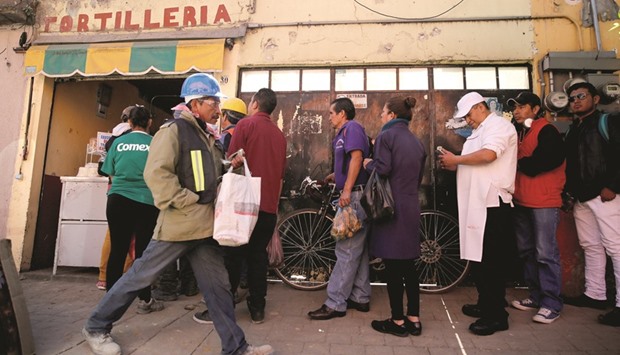Mexicans who already feel the pinch from a gasoline price hike share economists fears it will now drive up the cost of food and other basics, adding to the unpopularity of the government ahead of elections this year and next.
Riots that broke out after a 14% increase in regular gas prices on January 1 also reflected anger at President Enrique Pena Nieto over corruption, crime and the failure of reforms to improve living standards.
More increases in fuel prices are slated for February as the government phases out subsidies, but Pena Nieto vowed he would keep a lid on other consumer prices, and the central bank said any spike in inflation would be temporary.
In Mexico City’s Granada market this week, few gave credence to such reassurances, a sign of the risk for the ruling Institutional Revolutionary Party in governor elections this year and the 2018 presidential vote.
“I don’t believe the president at all,” said housewife Fabiola Hernandez as she left a market with corn tortillas from a shop that had just raised prices by one Mexican peso ($0.05) following the gasoline hike.
The head of Mexico’s tortilla association said prices for a kilo of the flat corn patties that are staple to the Mexican diet would rise by between one and three pesos this month above prices of 10 to 16 pesos per kilo last year, daily newspaper El Universal said.
“Really, I do not see a good outlook. People are really mad,” Hernandez said. “I don’t think there is going to be any benefit or that prices will remain the same, I think they are going to have to go up.”
A bigger jump in tortilla prices sparked protests in 2007.
“Providers have to raise prices because of the gasoline,” said trader Florentino Aguilar as he chopped raw chicken at another market. “That affects me because I don’t want to drastically jump to a high price because people get frightened.”
Inflation is also fanned higher by a record slump in the peso on fears US President-elect Donald Trump could crimp trade with Mexico.
Analysts say the peso could fall further if Trump slaps a threatened tax on exports from Mexico.
Higher consumer prices could hurt consumer demand, which has supported growth in Latin America’s No. 2 economy amid uneven demand for exports to the United States.
Consumer prices will rise by 1.61% in early January following the gasoline hike, according to analysts at Banamex.
That would be the highest month-on-month jump in 17 years.
Inflation data for early January is due January 24.
Morgan Stanley in a note on Friday revised its outlook for inflation this year from 3.9% to 5.1%, which would be the highest since 2008.
Morgan Stanley said the inflation could strengthen populist candidates, although the measure would help improve government finances.
Pena Nieto’s popularity sank to 24% in one November poll, the lowest since he took office in 2012.
On Friday, opposition lawmakers blasted government officials for implementing the hike without reigning in spending.

People queue to buy tortillas outside Granada market in Mexico City.


